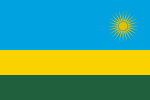Rwandan cuisine
| Part of a series on the |
| Culture of Rwanda |
|---|
 |
| People |
| Languages |
| Cuisine |
| Religion |
|
Art |
|
Literature |
| Music |
| Sport |

The cuisine of Rwanda is based on local staple foods produced by the traditional subsistence-level agriculture and has historically varied across different areas.[1]
Background
Rwandan staples include
Many Rwandans eat a lot of meat nowadays.
National dishes



Various dishes have evolved from the range of basic foods consumed. Ugali (or bugali), eaten throughout sub-Saharan Africa, is a paste made from maize and water to form a porridge-like consistency.[4] Isombe is made from mashed cassava leaves and served with meat or fish.[3]
Matoke is a dish made from baked or steamed bananas.[4] Ibihaza is made from pumpkins cut into pieces, mixed with beans and boiled without peeling them. The groundnut paste ikinyiga and millet flour paste umutsima w’uburo are made from boiling water and flour, mixed to a porridge-like consistency.[5] In the restaurants in the capital city of Kigali, locals and expatriates eat a variety of international cuisine, including Indian, Chinese, Italian, and African.[6] In other cities and towns, the cuisine is simpler, often consisting of chicken, fish, goat or steak served with rice or French fries.[6]
Beverages
Milk is a common drink among Rwandans.
Beers feature in traditional rituals and ceremonies and are generally consumed only by men.[3] Ikigage is an alcoholic beverage made from dry sorghum that is thought to have medicinal powers.[11] Ubuki is made from fermented honey with 12 percent alcohol content.[12]
See also
References
- ^ a b c d Adekunle, p.81
- ^ "Agriculture an important policy priority for Rwanda". Cenfri. 2022-09-21. Retrieved 2023-11-02.
- ^ a b c Adekunle, p.13
- ^ a b c Auzias, p.74
- ^ "Different types of Rwandan Food". www.therwandancook.com. Retrieved 18 February 2012.
- ^ a b Auzias, p.73
- ^ Adekunle, p.84
- ^ Mbabazi, Donah (2015-03-01). "Igikoma: The wonder dish". The New Times. Retrieved 2023-10-19.
- ^ King, p.129
- ^ Adekunle, p.86
- ^ Adekunle, p.85
- ^ Twagilimana, p.19
Bibliography
- Adekunle, Julius (2007). Culture and Customs of Rwanda. ISBN 978-0-313-33177-0.
- Auzias, Dominique (2007). Rwanda (in French). Petit Futé. ISBN 978-2-7469-2037-8.
- King, David C. (2007). Rwanda. ISBN 978-0-7614-2333-1.
- Twagilimana, Aimable (1997). Hutu and Tutsi. The Rosen Publishing Group. p. 19. ISBN 0-8239-1999-4.
